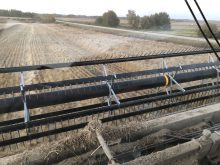Let’s play ‘what if?’
What if you signed a contract with your local grain company for $15 a bushel? And suddenly a few months later, prices had fallen to just $10 a bushel.
Would you be rushing down to the elevator to assure the local agent that it was OK, and they didn’t need to pay you the price you’d both willingly agreed upon?
I’m betting the answer is no, and to be clear, I wouldn’t blame you a bit. After all, a deal is a deal, and the company looked at the risk, and decided that was a portion of risk it was willing to try to eat.
Read Also

A short recap of the never-ending glyphosate saga
Prairie farmers are concerned about the chances of losing a herbicide that’s played a pivotal role in conservation agriculture — and the chill this saga puts on new product investment.
In the parlance of the schoolyard, there are no ‘backsies’ when it comes to making a deal.
That’s why it’s been a bit perplexing watching some of the province’s farm groups — most notably the Keystone Agricultural Producers — issuing calls for grain companies to forgo ‘administrative fees’ as the contract penalties are sometimes styled.
I doubt they’d be very happy if the grain companies tried to put that shoe on the other foot, and baked into it is more than a bit of ‘aww shucks, I’m just a farmer, how was I to know?’ that’s unbecoming to a sophisticated industry like agriculture.
As our Allan Dawson reports, in our front-page story of the Sept. 30 issue of the Co-operator, Bill Campbell, KAP president, admits the group has received some pushback from members on this position.
At least some of its membership thought that it was a mistake to take this position on contracts between two private parties that clearly both understood the risks.
While it is KAP’s job to represent the interests of farmers, there might be a better way to go about it. A good start is a planned marketing seminar that’s tentatively scheduled for the new year.
That would help ensure that farmers both understand the risks of these contracts, and that they are aware of other alternatives like options strategies, which Dawson delves into in great detail in his article.
Another way to approach the situation might be to try to ensure some greater level of transparency in the contracting process.
This isn’t new territory, we’ve seen it happen before in the agriculture sector.
In machinery sales, for example, there’s the Farm Machinery and Equipment Act which, in the words of the province “… protects farmers when they buy or lease farm machinery or farm equipment from Manitoba dealers, by governing purchase, delivery and repair.”
It provides on the website an example of a standardized contract that the dealer must complete and sign within Manitoba.
The grain industry is federally regulated, meaning a different level of government would need to take action, but with an ongoing review of the Canada Grain Act, the stage would appear to already be set for such a discussion.
Another example might be something like the “Wireless Code” that’s intended to protect cellphone customers in Canada.
Among its provisions is the requirement that “Your contract and related documents must be provided to you in plain language.”
But any contract alterations will need to be made after careful consideration and acknowledgment of the risks on both sides of this deal.
One of the biggest reasons for a grain merchant to sign a forward price contract is to ensure the grain its customers have purchased will be available, at a price that gives them some profit.
Their customer, in turn, is signing the contract to ensure they’ll have a supply of grain that lets them, say, mill flour and make a few dollars.
So moving one of the tiles in this puzzle is going to require a lot of further motion before things come to rest.
One sector, the pulse industry, has long included ‘act of God’ clauses in its contracts with producers to encourage production of the relatively small-acreage crops.
Just 10 years ago, at Pulse Days 2011, the industry was dissecting the effect those clauses had after a tough year that saw production curtailed due to flooding.
“This past year was both an eye-opener and quite a disappointing year in terms of the act of God,” one commodity trader told that meeting.
“I know that producers don’t want to plant (a crop) without an act of God, but I know that the trade wants a deferred delivery contract,” he told growers.
At least so far, the sector has largely stuck with some form of this contractual ‘out’ but that tension about the clauses remains.
There are now some contracts that allow the buyer to determine the volume that can be priced and covered by the clause.
The elevator companies are now individually looking at how this year has and will play out, according to Dawson’s story.
That means it’s a good idea for growers — and the groups that represent them — to do the same.
A better contract could help protect both parties more. And better education about the risks is imperative.















